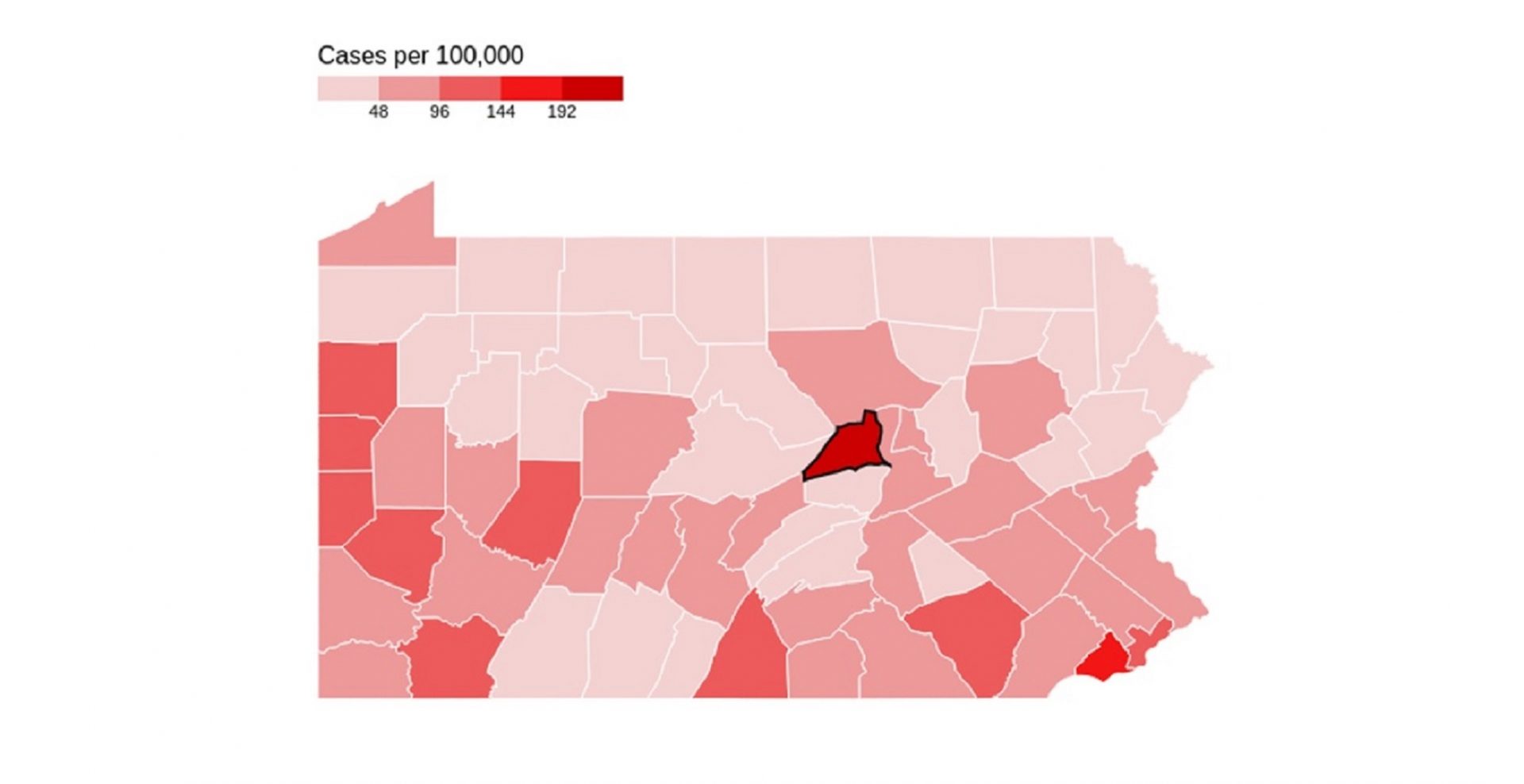Outbreak at Lewisburg federal prison drives surge in Union County COVID-19 cases
Sparsely populated Union County has the highest COVID-19 case rate in Pennsylvania.

Courtesy Bureau of Prisons
Courtesy Bureau of Prisons
(Harrisburg) — An outbreak at the federal prison in Lewisburg is driving a surge in coronavirus cases in Union County.
The rural midstate county is home to 45,000 people, but has Pennsylvania’s highest rate of COVID-19 infection: 185 cases per 100,000 people confirmed from July 31 through August 6.
That’s more than double the case rate of any other county in Pennsylvania during that same span of time, and is more than four times the average incidence rate across the commonwealth.
The federal prison bureau says the outbreak has infected at least 18 inmates and one prison worker. However, the state health department challenges that number, with spokesperson Nate Wardle saying “significantly more” cases are tied to the facility.
“Largely, this is an isolated situation, but it emphasizes the importance of mitigation efforts,” Wardle said. “Often, the introduction of cases into a congregate care facility [is] when an asymptomatic or pre-symptomatic employee carries the case in.”
Wardle said so-called “superspreader” events like this are especially likely in places like prisons or nursing homes where many people live close together, and “is concerning as we head toward the school year.” The health department is recommending that Union County hold school online instead of in person this fall.
Lewisburg Mayor Judy Wagner said people have been taking precautions and following guidelines, knowing that Bucknell University students will be converging on the town in weeks.
“The only thing is, the staff doesn’t just live in Lewisburg,” Wagner said. “ They live all in the surrounding area. So even people with the best of policies, the best of intentions, you know, none of us are perfect.”

Courtesy of Spotlight PA
Union County has few coronavirus cases compared to cities like Philadelphia or busy suburbs like Delaware County. However, its incidence rate is the highest in the state, showing the risks of “superspreader” events even in rural areas.
A total of 247 people have tested positive for the virus in Union County. That’s a small number compared to places like Delaware or Allegheny counties, but it’s a significant number for a small community, and a reminder that people must continue to wear masks and follow safety guidelines, Wardle said.
For the roughly 1,400 men incarcerated at the high security federal prison, the risk is higher, though an extensive mitigation effort is in place.
Bureau of Prisons spokesperson Justin Long says employees are being temperature checked and screened, and inmates who test positive are put in quarantine. No visitors are allowed, and rapid testing is widely available for inmates.
Long said the prison does not have any intensive care beds on-site. There are ventilators on hand, Long says, and inmates who need acute care will be taken to the hospital.”
“While a prison setting is unique when addressing a pandemic, the care and treatment of an identified positive COVID-19 case is not,” Long said.
“The [Bureau of Prisons] follows CDC guidance the same as community doctors and hospitals with regard to quarantine and isolation procedures, along with providing appropriate treatment.”
In the midstate
Here’s a look at case rates across the midstate. This number represents how many people are infected per 100,000 residents during the period of time from July 31 through August 6:
- Adams — 33
- Berks — 39
- Cumberland — 27
- Dauphin — 42
- Franklin — 36
- Fulton — 28
- Huntington — 29
- Juniata — 24
- Lancaster —53
- Lebanon — 20
- Mifflin —33
- Northumberland — 51
- Perry — 13
- Schuylkill — 22
- Snyder — 12
- Union — 185
- York — 48
Brett Sholtis was a health reporter for WITF/Transforming Health until early 2023. Sholtis is the 2021-2022 Reveal Benjamin von Sternenfels Rosenthal Grantee for Mental Health Investigative Journalism with the Rosalynn Carter Fellowships for Mental Health Journalism. His award-winning work on problem areas in mental health policy and policing helped to get a woman moved from a county jail to a psychiatric facility. Sholtis is a University of Pittsburgh graduate and a Pennsylvania Army National Guard Kosovo campaign veteran.



